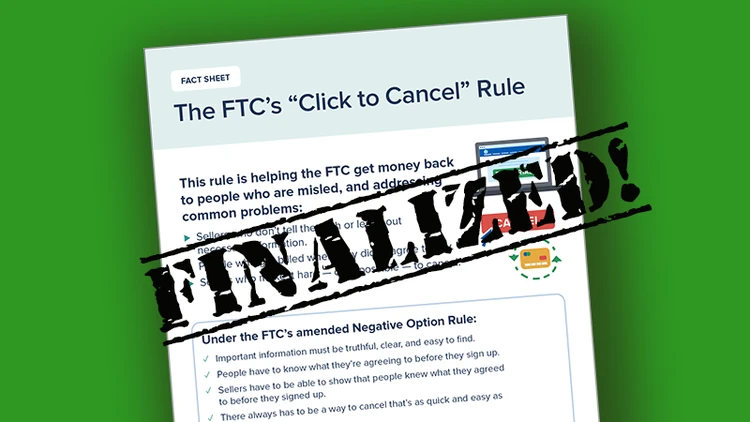But, consumers should still take other precautions once it's all in place

Raise a glass, because the Federal Trade Commission (FTC) has finalized its "Click to Cancel" rule. The rule, set to take effect soon, aims to protect consumers from deceptive subscription practices, making it easier for consumers to end recurring subscriptions.
Companies must now offer an easy cancellation option that's as simple as signing up, such as online cancellations. That means that companies that ConsumerAffairs reviewers have said make canceling subcriptions difficultlike Adobe, Ancestry, B&H Photo, BarkBox, Coursera, DISH Network, Dollar Shave Club, eharmony, HelloFresh, Match.com, McAfee, Nutrisystem, Office Depot, Planet Fitness, and SiriusXM Satellite Radio will now be prohibited from making unnecessary offers or conditions before allowing consumers to cancel. A cherry on top is that, going forward, businesses must provide clear and simple terms about recurring charges upfront.
The vote to finalize that rule was a squeaker, too. The Commission vote approving publication of the final rule was 3-2. Most of the final rules provisions will go into effect 180 days after it is published in the Federal Register.
The FTC for decades has fielded thousands of complaints every year about subscriptions renewed without consent. Also, many consumers complained about cases where they tried to cancel, but encountered a never-ending phone tree or online maze that required click after click after click, only to find themselves back at the beginning. The new rules give consumers more freedom to switch providers, read a different news service, buy a different pet food or none at all, Teresa Murray, Consumer Watchdog Director at Public Interest Research Group, said in an email to ConsumerAffairs.
These rules come after the FTC sued two huge companies, Amazon and Adobe, over allegations they used dark patterns to rope customers into expensive recurring subscriptions and make it extremely difficult to cancel. Those lawsuits are not yet resolved, but its clearly time to turn the page on unwanted subscriptions.
Another toasting the passage was Lisa Gilbert, co-president of Public Citizen, who said that the process is finally out of the hands of greedy corporations [who] have made a habit of obfuscating and overcomplicating the cancellation process. The FTCs new rule is a straightforward solution that will save consumers time, money, and customer service headaches.
Going forward, heres how simple cancellations are supposed to be
The final rule will provide a consistent legal framework by prohibiting sellers from:
-
Misrepresenting any material fact made while marketing goods or services with a negative option feature;
-
Failing to clearly and conspicuously disclose material terms prior to obtaining a consumers billing information in connection with a negative option feature;
-
Failing to obtain a consumers express informed consent to the negative option feature before charging the consumer; and
-
Failing to provide a simple mechanism to cancel the negative option feature and immediately halt charges.
But, Murray says that consumers shouldnt stop there. Even once these rules take effect, likely next spring, there are steps you can take to prevent headaches, she said, offering these suggestions:
-
Think twice about that free trial subscription. You want just to watch that one movie or use that service one time. You almost always have to link a payment to sign up for something thats free. That can lead to problems if you dont cancel or the company messes up.
-
Never use a debit card. Always use a credit card for a subscription, membership, whatever. Debit cards link to your bank account. That can make it difficult to get your money back and can even lead to costly overdraft fees. Heres more about the dangers of debit cards.
If the company continues to charge you, you have far greater protections with a credit card than a debit card under the Fair Credit Billing Act. -
Read terms and conditions and watch out for pre-checked boxes. A lot of companies may, by default, check boxes that give them permission to charge you after the free trial expires or even sign you up for other products or services or unwanted marketing messages that flood your inbox or voicemail. Uncheck the boxes you dont agree with.
-
Keep copies of emails or text messages sent to you when you signed up, and any screenshots of your efforts to cancel, or any notes from a phone call, including the name of who you spoke with.
-
Put reminders in your calendar. If its a one-year subscription, schedule a calendar reminder for maybe a couple of weeks before the automatic renewal date, and again a few days ahead of time, and just cancel then. Dont wait until the last minute.
-
Remove any credit card information from your account if you can, to ensure you arent charged for another billing cycle. If you need to provide some payment method before deleting the one youve been using, use a prepaid debit card with barely any money on it (not one connected to a checking account because that could cause an overdraft fee.) The prepaid card wont work and wont lead to overdraft fees. Maybe you have a no-fee prepaid card from a rebate or refund. This is ideal.
Complain to the FTC and your state attorney general if you have problems canceling.
Photo Credit: Consumer Affairs News Department Images
Posted: 2024-10-17 00:09:58



















